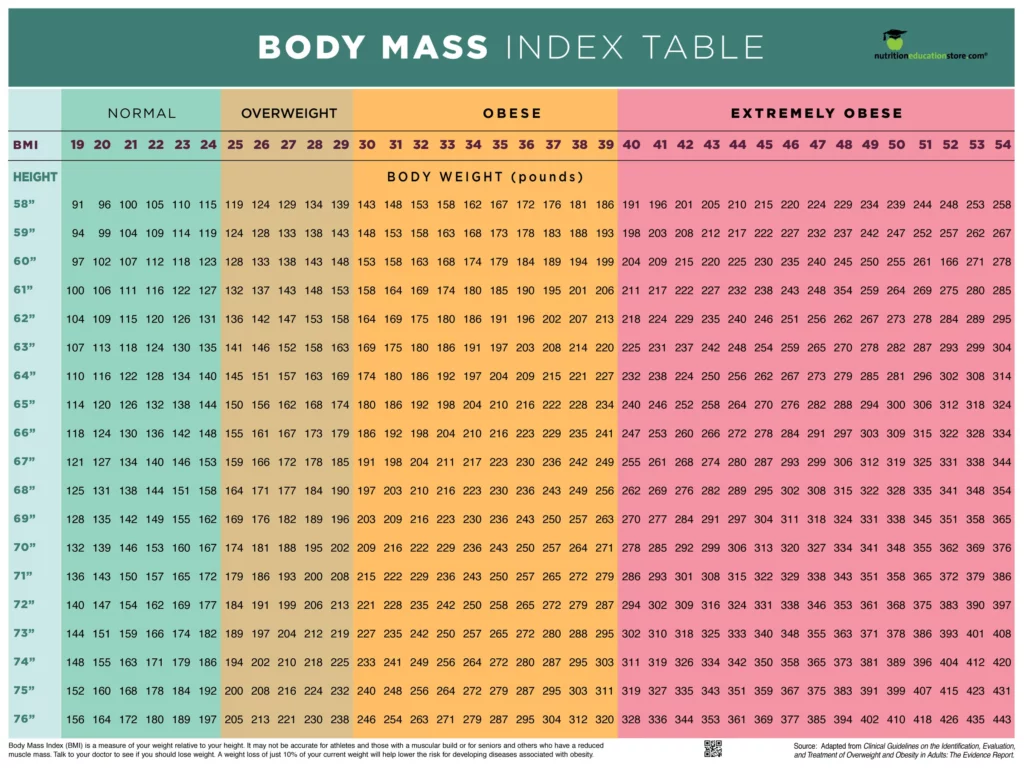Maintaining a healthy weight is important for everyone, but it can be especially challenging know what’s a normal weight for a 13-year-old.
With all of the changes happening in their bodies, it’s tough for kids to know what a “normal” weight is.
In this article, we’ll take a look at some common weight milestones for 13-year-olds and offer some tips on how to maintain a healthy weight during this time of growth.
Normal Weight for a 13-Year-Old
The average weight for a 13-year-old boy or girl who is 5’2″ is 104-131 lbs according to the BMI index.
For a boy or girl who is 5 feet exactly, this would be 97-123 lbs.
For 5’4″, this comes to 110-140 lbs.
However, it’s important to remember that these are just averages and that your child may be above or below the average weight for their age and still be healthy.
The best way to determine if your child is at a healthy weight is to consult with their doctor.
Maintaining a Healthy Weight as a 13-Year-Old
There are a few things you can do as a parent to help your child maintain a healthy weight during their teenage years.
First, encourage them to eat a balanced diet that includes plenty of fruits, vegetables, and whole grains. It’s also important to limit sugary drinks and snacks.
Help them stay active by encouraging them to participate in sports or other activities that they enjoy.
And finally, make sure they’re getting enough sleep each night.
By following these simple tips, you can help your child develop healthy habits that will last a lifetime.
What is Overweight for a 13-Year Old?
Based on the BMI index, this would be based on their height.
At 5’4″, the “overweight” range starts at 145 lbs while the “obese” range starts at 174 lbs. “Extremely obese” starts at 232 lbs.
Interpreting Body Mass Index (BMI)
Your Body Mass Index, or BMI, is a number that represents the ratio of your height to your weight.
It’s used as a screening tool to identify possible weight problems.

To calculate your BMI, divide your weight in pounds by your height in inches squared and multiply by 703.
A BMI of 25 to 29.9 is considered overweight. A BMI of 30 or higher is considered obese.
Obesity increases your risk for many serious health conditions, including diabetes, high blood pressure, heart disease, stroke, and certain types of cancer.
If you’re concerned about your child’s BMI, talk to their doctor or another healthcare provider about ways to lose weight safely.
Interpreting Body Mass Index (BMI) Percentiles for Teens
The BMI percentile shows how your child’s weight compares to other children.
It is based on the height and weight measurements of kids who are the same age and gender.
BMI values less than the 5th percentile are considered underweight.
A BMI at or above the 85th percentile but less than the 95th percentile is considered overweight.
A BMI at or above the 95th percentile is considered obese.
If your 13-year-old falls into any of these categories, it’s important to talk to their doctor about ways to help them reach a healthy weight.
There are a number of factors that can contribute to obesity, including genetics, lifestyle choices, and underlying medical conditions.
Should a 13-Year-Old Go On a Diet?
If your 13-year-old is overweight or obese, their doctor may recommend a weight-loss plan.
This could involve making changes to their diet and physical activity level.
The goal of a weight-loss plan is to help your child reach and maintain a healthy weight.
It’s important to talk to their doctor before making any changes to their diet or physical activity level.
Sudden changes can be dangerous for kids, especially if they’re not getting the nutrients they need.
Tips For a Healthy Weight and Lifestyle at 14 Years Old
There are a few things you can do as a parent to help your child maintain a healthy weight during their teenage years.
Balanced diet
First, encourage them to eat a balanced diet that includes plenty of fruits, vegetables, and whole grains.
It’s also important to limit sugary drinks and snacks.
Stay active
Help them stay active by encouraging them to participate in sports or other activities that they enjoy.
Quality sleep
And finally, make sure they’re getting enough sleep each night.
By following these simple tips, you can help your child develop healthy habits that will last a lifetime.
Stress management
As a teenager, your child is going through a lot of changes both physically and emotionally.
It’s important to help them manage their stress in healthy ways.
Encourage them to talk to you or another trusted adult about what’s going on in their life.
Help them find healthy outlets for their stress, such as exercise, journaling, or spending time with friends and family.
By teaching your child how to manage their stress, you can help them reduce their risk for developing anxiety or depression later in life.
What Are Some Healthy Weight-Loss Strategies for Teens?
There are a number of healthy ways for teens to lose weight, including:
- Cutting back on sugary drinks and snacks
- Eating smaller portions
- Making time for breakfast
- Staying active
- Avoiding eating late at night
If your teen is interested in losing weight, talk to their doctor or another healthcare provider about the best way to go about it.
They can help create a plan that’s right for your child and offer support along the way.
How Much Should You Weigh For Your Height, Gender, And Body Frame Size?
FAQs – Normal Weight for a 13-Year-Old
What’s the average weight for a 13-year-old boy?
The average weight for a 13-year-old boy is between 75 and 145 pounds, depending on their height.
What’s the average weight for a 13-year-old girl?
The average weight for a 13-year-old girl is between 76 and 148 pounds, depending on their height.
What’s the ideal weight for a 13-year-old?
There is no such thing as an “ideal” weight for a 13-year-old.
BMI is just one way to assess whether someone is at a healthy weight.
Other factors, such as body composition, muscle mass, and overall health, are also important considerations.
How many calories for a 13-year-old?
The number of calories a 13-year-old needs depends on their age, gender, height, weight, and activity level.
Most teens need between 1,600 and 2,400 calories per day.
Talk to your child’s doctor or a registered dietitian if you’re concerned about their calorie intake.
They can help create a healthy eating plan that meets your child’s individual needs.
Is it normal for my 13-year-old to lose weight?
Yes, it’s perfectly normal for teenagers to see their weight fluctuate as they grow and develop.
However, sudden or significant weight loss can be a sign of an underlying medical condition.
If you’re concerned about your child’s weight loss, talk to their doctor.
They can help determine if there’s a cause for concern and offer guidance on how to help your child gain weight in a healthy way.
What are some signs that my 13-year-old is overweight?
There are a few signs that may indicate that your child is overweight, including:
- Excess body fat (measured by BMI)
- High blood pressure
- High cholesterol levels
- Type 2 diabetes
- Sleep apnea
- Joint pain or respiratory problems
If you’re concerned about your child’s weight, talk to their doctor.
They can perform a physical exam and order tests to check for any underlying medical conditions.
Conclusion – Normal Weight for a 13-Year-Old
The teenage years can be tough when it comes to maintaining a healthy weight. With all of the changes happening in their bodies, it’s tough for kids to know what a “normal” weight is.
In this article, we’ve taken a look at some common weight milestones for 13-year-olds and offered some tips on how to maintain a healthy weight during this time of growth.
If you’re concerned about your child’s weight, talk to their doctor or another healthcare provider. They can help you create a plan that’s right for your child and offer support along the way.


